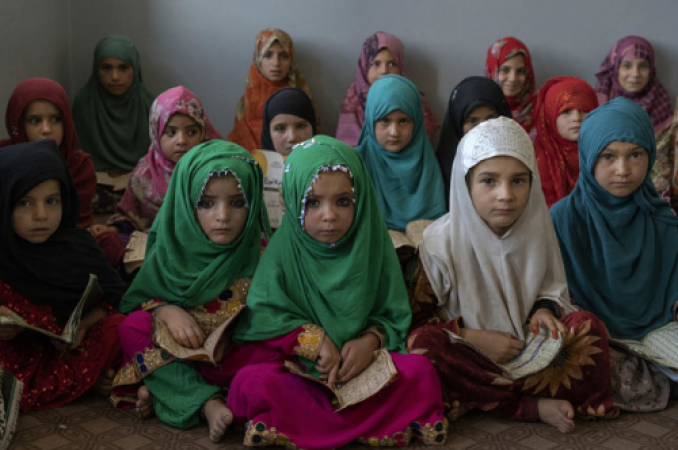
UNO: Based to the UN's special envoy for global education, Taliban leaders should be tried for a crime against humanity at the International Criminal Court for keeping Afghan girls and women out of school and out of the workforce.
On the second anniversary of the Taliban taking control of Afghanistan, Gordon Brown stated at a televised UN press conference that the country's leaders are to blame for "the most egregious, vicious, and indefensible violation of women's rights and girls' rights in the world today."
The former British prime minister claimed to have sent ICC prosecutor Karim Khan a legal opinion demonstrating that denying women access to education and employment constitutes "gender discrimination, which should count as a crime against humanity, and it should be prosecuted by the International Criminal Court."
Also Read: Diplomatic Clash: North Korea Rejects US Bid for UN Meeting on Human Rights Record
In the final weeks before the US and NATO forces withdrew from Afghanistan after 20 years of war, in August 2021, the Taliban came to power. The Taliban gradually reinstituted their strict interpretation of Islamic law, or Sharia, as they had done during their previous rule of Afghanistan from 1996 to 2001, banning women from most jobs, public places, and gyms, and recently closing beauty salons.
Brown called on major Muslim nations to send a delegation of clerics to Kandahar, in southern Afghanistan, where Hibatullah Akhundzada, the Taliban's supreme leader, lives, to argue that restrictions on women's employment and education have "no basis in the Qur'an or the Islamic religion" and to call for their lifting.
He asserted that he thinks "there's a split within the regime," with many individuals in the education ministry and other areas of Kabul's administration advocating for the restoration of girls' rights to an education. And according to my estimation, the clerics in Kandahar have vehemently opposed that and are still issuing directives.
In an interview with the Associated Press late Monday in Kabul, the Taliban's top spokesman, Zabihullah Mujahid, dismissed inquiries about restrictions on girls and women, saying the current situation will continue. Additionally, he stated that the Taliban see their rule over Afghanistan as unending, deriving legitimacy from Islamic law, and not being seriously threatened.
Also Read: Desperate Flight: Myanmar Detains 150 Fleeing Rohingya in Escalating Humanitarian Crisis
According to Brown, the Taliban should be informed that education aid to Afghanistan, which was suspended after the bans were announced, will be reinstated if girls are once again permitted to attend secondary school and universities.
In addition, he demanded that sanctions be taken against those directly responsible for the bans, including by the United States and the United Kingdom, as well as the release of those who had been detained for defending the rights of women and girls.
In 54 of the 80 edicts the Taliban issued, according to Brown, they specifically target women and girls and trample on their rights. The most recent one forbade them from sitting for university exams and from going to public places, such as cemeteries, to pay respects to loved ones.
He declared that the UN and other organisations would support and finance Internet education for girls, assist with the funding of clandestine schools, and provide education for Afghan girls who had to flee the country but needed assistance attending school.
The Afghan government's restrictions on education must not deter the international community from demonstrating that it is possible to reach Afghans there.
In addition to the numerous organisations that support underground schools, according to Brown, there has recently been a new initiative to deliver curriculum using mobile phones, which are common in Afghanistan.
There is no doubt that girls are still trying to learn, sometimes at great risk, he said, declining to go into specifics out of concern for the safety of the students and teachers.
Also Read: 3 drones reportedly shot down by Russia southwest of Moscow
According to Brown, 6 million girls received an education during the 20 years the Taliban were deposed, going on to become doctors, lawyers, judges, members of parliament, and cabinet ministers.
He claimed that 3 million more girls will leave primary school in the coming years, adding that 2.5 million girls are currently denied an education, "so we're losing the talents of a whole generation."
In order to persuade the Taliban to reinstate the rights of women and girls, Brown urged international pressure and action rather than just words.
"We have not done enough in the last two years," he claimed. "I don't want another year to pass where Afghan women and girls feel helpless because we haven't done enough to support them," she said